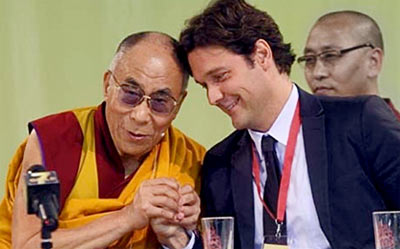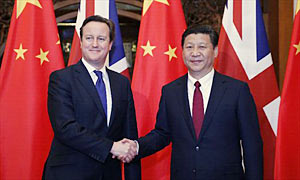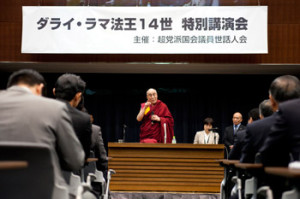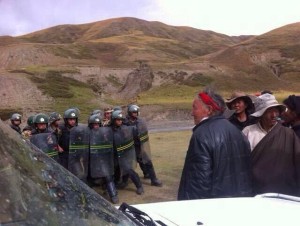New ICT president seeks to enhance Tibet issue in global capitals and societies

His Holiness the Dalai Lama and Matteo Mecacci at a press conference in Assago, Italy on June 28, 2012.
Tibetan father passes following self-immolation protest

Kunchok Tseten set fire to himself on December 3, in Ngaba.
Tibet’s state of play in London, Washington, Madrid, and Tokyo

David Cameron and Xi Jinping
While Cameron’s overtures towards officials in Beijing appear to have been long in the making, a visiting five-member delegation from the Tibetan Parliament-in-exile in Dharamsala, India continued to push British officials on Tibet during their recent eight-day stay in the UK hosted by ICT. The group met with British House of Commons Speaker John Bercow, who hosted the Dalai Lama in June 2012, as well as other British Parliamentarians, and encouraged them to urge Cameron to address the Tibet issue during his trip. The closest Cameron appears to have come in addressing the topic, however, came when he responded to a question about the 2012 meeting with the Tibetan spiritual leader by saying, “I don’t regret any of the things I’ve done in my political life.”
Elsewhere in Europe, the Tibet issue has become a focal point in relations between Spain and China after a Spanish national court issued arrest warrants for five Chinese leaders under the principle of universal jurisdiction. One Chinese government official referred to the case as “malicious persecution,” as the Chinese government seeks to apply pressure on Spain. The government of Spanish Prime Minister Mariano Rajoy now appears set to enact a change Spanish law that would curtail the courts powers to further pursue the cases.
In contrast to the approach that has been adopted by the UK and Spain, one is able to look towards the United States for its persistence in giving Tibet a prominent role in U.S. dialogues with the Chinese and at the UN Human Rights Council, despite the nearly year-long vacancy at the office for the U.S. Special Coordinator for Tibetan Issues, the congressionally mandated position created to organize Tibet policy across the U.S. government. While the Obama Administration has nominated former Clinton Administration staffer and Harvard professor Sarah Sewall for the role, “bureaucracy and the slowness of the process to fill key positions,” rather than “policy or political concerns,” have caused the hold-up, according the ICT’s Director of Government Relations, Todd Stein. While Stein points out that there are hopes the “end-of-the-year flurry of activity in Congress” will push Sewall’s nomination through, it is possible her nomination won’t be up for approval again until after the start of the new year.
 While other countries may appear bogged down in their raising of the Tibet issue, the Dalai Lama recently completed a 12-day visit to Japan, which included a discussion lecture on the contribution of science and technology to human happiness; a speaking engagement with university students; and a meeting with the congregation of an ancient Japanese Buddhist temple. While in Tokyo, the Dalai Lama was welcomed at Japan’s parliament, where he spoke with a diverse gathering of 150 members and raised the issue of Tibetan cultural preservation. Before leaving the country, the Tibetan spiritual leader met with a group of Tibetans residing in Japan, and spoke in support of the Middle Way Approach, “in hope of solving our problem by reaching a mutually beneficial solution.” It should be noted that the Dalai Lama’s long-standing commitment to engaging with the leadership in Beijing continues, despite the Communist Party’s routine condemnation of the Tibetan spiritual leader. Until the Party stops sanctioning the vilification of the Dalai Lama, the Chinese leadership will only create further discord between themselves and the reality of what is taking place in Tibet today.
While other countries may appear bogged down in their raising of the Tibet issue, the Dalai Lama recently completed a 12-day visit to Japan, which included a discussion lecture on the contribution of science and technology to human happiness; a speaking engagement with university students; and a meeting with the congregation of an ancient Japanese Buddhist temple. While in Tokyo, the Dalai Lama was welcomed at Japan’s parliament, where he spoke with a diverse gathering of 150 members and raised the issue of Tibetan cultural preservation. Before leaving the country, the Tibetan spiritual leader met with a group of Tibetans residing in Japan, and spoke in support of the Middle Way Approach, “in hope of solving our problem by reaching a mutually beneficial solution.” It should be noted that the Dalai Lama’s long-standing commitment to engaging with the leadership in Beijing continues, despite the Communist Party’s routine condemnation of the Tibetan spiritual leader. Until the Party stops sanctioning the vilification of the Dalai Lama, the Chinese leadership will only create further discord between themselves and the reality of what is taking place in Tibet today.
Major media amplifies change needed in Tibet
 People’s Armed Police and unarmed local Tibetans in Garchung Village in Dathang Township, Driru county, Nagchu.  2013 Snowlion Award recipients and jury members: Eva Corell (jury), Nathalie Nad-Abonji, Martina Powell (for Mara Simperler), Bernhard Bartsch, Andreas Lorenz (jury). On the right ICT-Germany Executive Director Kai Müller. |
The New York Times and the Wall Street Journal both recently published opinion pieces regarding the current repression taking place in Tibet and calling upon the Chinese leadership to reengage with the Dalai Lama in order to resolve the Tibet issue. Both articles noted the plight of the over 120 Tibetan self-immolations that have occurred over the last four years, as well as the increased repression carried out by authorities since 2008. The Times article, written by the paper’s editorial board, made specific note of Chinese President Xi Jinping’s willingness to take on wide-ranging domestic issues during a recent major Communist Party meeting, saying that “[h]e should move now to ease some of the most damaging policies on Tibet.”
Outspoken coverage of the Tibet issue in print was also recently on display in Berlin, as ICT-Germany hosted its annual “Snow Lion” award ceremony on November 16, recognizing excellence in independent reporting on Tibet. The first prizewinner was Austrian journalist Mara Simperler for her article “Freedom in Flames,” which included in-depth interviews with three Tibetans in exile in India. In addition to the second and third place prizewinners, for the second year in a row ICT Germany awarded a research grant to fund a proposal by a promising young journalist. ICT Germany’s award comes at a critical juncture for reporting on Tibet, as authorities implement increasingly harsh measures in order to restrict press freedoms throughout the People’s Republic of China, including blocking some foreign journalists from entering the country.

